Rumi
You wake the dead to life
Who brings you to praise? Rumi’s great poem of praise to the “you” is to his great friend Shams, and through that friendship, to God.
We’re pleased to offer Rumi’s poem, and invite you to connect with Poetry Unbound throughout this season.
Order your copy of Poetry Unbound: 50 Poems to Open Your World and join us in our vibrant conversational space on Substack.
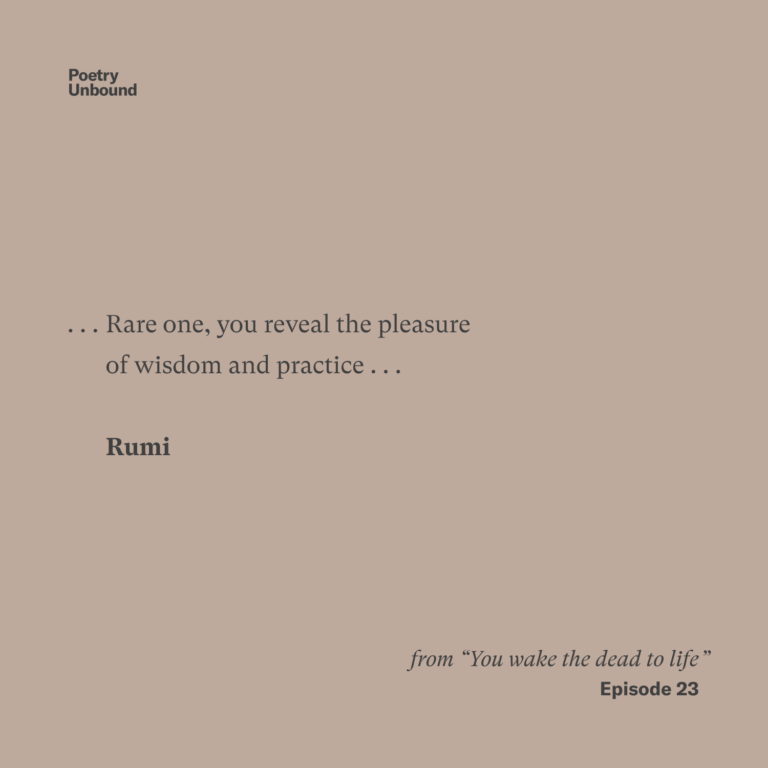
Guests
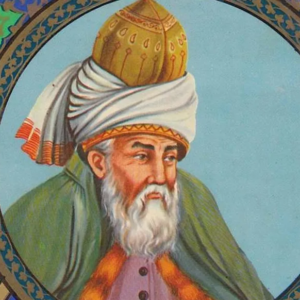
Rumi was a 13th-century Muslim mystic and poet. He left behind a vast body of lyric poetry, metaphysical writings, lectures, and letters, which have influenced Persian, Urdu, and Turkish literature across the centuries.
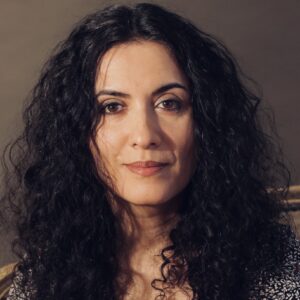
Haleh Liza Gafori is a translator, vocalist, poet, and educator of Persian descent born in New York City. She has sung and translated the poetry of various Persian poets for well over a decade. She is the translator of GOLD (New York Review of Books / NYRB Classics 2022), translations of poems by Rumi, the 13th-century Muslim mystic and poet. Gafori has taught classes at Dartmouth University, Massachusetts College of Liberal Arts, Taos Poetry Festival, and the Omega Institute.
Transcript
Pádraig Ó Tuama: Friends, thanks very much for listening to Poetry Unbound, whether you’re new or you’ve listened to them all — your attention makes everything worthwhile. I’ve got some news: I’ve written a book, Poetry Unbound: 50 Poems to Open Your World. There’s 50 poems, each with a fresh essay written by me. I’d love it if you’d buy it, or buy a few. And you can join up to our free interactive newsletter, as well. Links to everything at poetryunbound.org.
[music: “Praise the Rain” by Gautam Srikishan]
My name is Pádraig Ó Tuama and a number of years ago, I was in New York City for some work meetings. And Krista Tippett, with whom I now work in On Being, invited me to a meal. I went along to the meal and sat next to someone. And at that meal, I made a friend who has changed my life. Me and Marie became friends in a way that I knew from that moment, something has changed in me. This is a relationship that is going to give me language and friendship and exchange to ask of me and to give to me. It has continued to be a nurturing friendship and my heart has changed and full of gratitude, to her, but also to whatever it is that she points to. I am in awe and something, perhaps, even close to adoration about that which gave birth to this friendship.
[music: “Praise the Rain” by Gautam Srikishan]
“You wake the dead to life” by Rumi (Translated by Haleh Liza Gafori)
“You wake the dead to life,
you fountain of grace,
you fire in thickets of tangled thought.
“Today you arrived beaming with laughter—
that swinging key that unlocks prison doors.
“You are hope’s beating heart.
You are a doorway to the sun.
You are the one I seek and the one who seeks me.
Beginning and end.
“You greet need with generous hands.
You flood us with spirit,
“rising from the heart,
lifting thought.
“Rare one, you reveal the pleasure
of wisdom and practice.
“Beyond these, what is there
but excuses and deceit?
“We lust after the afterlife.
We stew over trinkets.
We stage battles between black and white.
Our ears are plugged with twisted delusions.
“You carry the cure.
“Silence!
I’m in a hurry. Leave the paper. Break the pen.
The cupbearer is here, jug in hand.
“Meet us in the land of insight,
camped under ecstasy’s flag.”
[music: “First Grief, First Air” by Gautam Srikishan]
Rumi is a very popular poet. I think one of the most popular poets in the United States. He was born Jalāl ad-Dīn Muhammad Balkhī in 1207. That was in the city of Balkh in present day Afghanistan. And he’s known as Rumi. He’s also known as Mawlānā or other variations, meaning “our master.” There are many versions of translations of Rumi, and all translation is a complicated art and a beautiful art and a form of interpretation.
And Haleh Liza Gafori is a poet and translator and also a singer. And she’s renowned for teaching classes on Rumi, on translating Rumi like she’s done here, but also in singing Rumi and bringing the music of the language— it’s written in Persian and Farsi— to people so that they can hear the sounds of the music in the recitation.
This poem of Rumi’s is called, for the purposes of this edition, “You wake the dead to life”. These poems don’t have titles, it’s just the first line. And who is the “you”? You hear a gorgeous music of love and deep dedication in the opening stanza: “You wake the dead to life, / you fountain of grace, / you fire in thickets of tangled thought.” Who is this “you”?
Rumi’s life was fundamentally changed and altered when he was about 38. He was a hugely sought after preacher and legal scholar and teacher. At the age of 38, he met the friend, Shams. And so in Shams, he finds this friendship that directs his attention to devotion into an utterly new way.
At one point, in another poem, he calls Shams “the cave”. And cave in Islamic thought is so important because, of course, it was in the cave where the Prophet received the revelation. And so by calling Shams a cave elsewhere, what we hear from Rumi is that he’s saying that Shams is the friend, but also in that friendship, it was a place where the beloved, where God, where Allah, was encountered. He takes the experience of loving a friend and goes deeper with it to say, “what does this say to me about what I consider to be most fundamental to the world? Most like the ‘fire in the thickets of tangled thought’? How is it that a friend can burn away tangled thought and show you what’s underneath?” He sees friendship on the one hand as something that happens in the here and now, and deeper than that, like some underground stream. Friendship is the thing that opens him to God.
[music: “Gaena” by Blue Dot Sessions]
There’s two lines in this poem. That I repeat to myself over and over, one of them is: “You are the one I seek and the one who seeks me.” And in my reading of Rumi, this seems to be a classic formulation: that the heart seeks after beauty, but beauty has already seated itself in the heart to cause the heart to seek after beauty. There is something like a holy circle, some kind of place where yearning is fed and what feeds yearning is yearning itself. And in that sacred tension, you find something of God. “You are the one I seek and the one who seeks me.”
Later on in the poem, Rumi says, “Rare one, you reveal the pleasure / of wisdom and practice.” Three extraordinarily important words to put together when it comes to thinking about who Rumi was: pleasure, wisdom, and practice. You hear delight so often in Rumi, you hear his spontaneity and his openness to what’s happening around him. You see somebody who was so open to the world.
And, at the same time, I think it’s fair to say that in many of the ways that Rumi’s spoken about there’s a profound erasure that’s happened, because he speaks here about wisdom and practice. He always was a Muslim, but it can be easy to hear people saying that he was so universal that he was no one thing. And that is a huge disservice to Rumi.
A number of years ago, there was a hashtag that went wild around Twitter, #RumiWasMuslim, and that is such an important corrective. Rumi did have profound, poetic, beautiful, insights to the human experience. And he did that from within the tradition that he loved, from within the tradition that shaped him the deep practices of religion and law and theology and teaching that were his world. And within the context of the particular, there it was that he saw the kinds of things that continue to move us 800 years later.
[music: “Family Tree” by Gautam Srikishan]
There’s a section in the poem when he speaks about the kind of things that can distract you. “We lust after the afterlife. / We stew over trinkets.” And then, “…battles between black and white.” And “…ears plugged with twisted delusions.”
The first of those four, “We lust after the afterlife”, is such a fascinating thing. Rumi’s life was so shaped by having been a man of deep theological importance as a teacher and as an interpreter of law and as a devotee. And yet it was also this that he needed to give up when he met Shams, that he was being called into a Pilgrim way. Called into a way that brought him into places of isolation and wilderness, brought him into poetry. And in a certain sense, you can see that it’s easy to say “we stew over trinkets.” Like you get in the second one, but you see his subtlety when he speaks too about the very things that can be nurturing, that in the midst of being nurturing can also be a distraction. The desire for the afterlife in so many religious practices is a huge motivator, but he’s saying, “that too will not serve you.”
After those four demonstrations of things that can distract us, he says, “You carry the cure.” Remembering he’s speaking to Shams and speaking through Shams, the friend to the beloved, and thinking, “[t]he cupbearer is here, jug in hand.”
As I was thinking about this final stanza, I phoned Haleh Liza Gafori to say to her, “what’s happening in the last part, in the cupbearer?” She told me that in the context of Rumi’s poems, when there’s wine or the cupbearer with wine there, it’s always a demonstration of the generosity and the overflowing nature of the beloved. “The cupbearer is here, jug in hand.” Don’t be distracted, even by your art, perhaps, even by the beautiful thing that you’re pursuing. Don’t be distracted by that if there’s something much more important. In Rumi, we hear somebody for whom ambition is deeply rooted to what is most important.
And it finishes then: “Meet us in the land of insight, / camped under ecstasy’s flag.” “Meet us”. This joining together– in friendship, in gathering, in calling together of people who are following after what it means to follow the Beloved. In Rumi here, you find the “us,” the gathering in the land camped under a flag, the flag of ecstasy.
[music: “The Willows” by Gautam Srikishan]
Rumi had a profound and deep and changing friendship with Shams, and I think it’s a really important thing to recognize how in Rumi’s life, a friendship, a particular friendship, was something that became the center point for his deepest yearnings: for God, for religion, for knowing what’s important in the life. Our friendships change us profoundly, and in Rumi we hear how a praise song to a friend is also a praise song to God.
What I find really helpful in this is knowing where he began and then allowing the particular of that to speak to the context now. Each poem has so much blank space around it. I’m curious how people might think, “who is it that I would turn to and say ‘you carry the cure?’”.
[music: “The Willows” by Gautam Srikishan]
“You wake the dead to life” by Rumi (Translated by Haleh Liza Gafori)
“You wake the dead to life,
you fountain of grace,
you fire in thickets of tangled thought.
“Today you arrived beaming with laughter—
that swinging key that unlocks prison doors.
“You are hope’s beating heart.
You are a doorway to the sun.
You are the one I seek and the one who seeks me.
Beginning and end.
“You greet need with generous hands.
You flood us with spirit,
“rising from the heart,
lifting thought.
“Rare one, you reveal the pleasure
of wisdom and practice.
“Beyond these, what is there
but excuses and deceit?
“We lust after the afterlife.
We stew over trinkets.
We stage battles between black and white.
Our ears are plugged with twisted delusions.
“You carry the cure.
“Silence!
I’m in a hurry. Leave the paper. Break the pen.
The cupbearer is here, jug in hand.
“Meet us in the land of insight,
camped under ecstasy’s flag.”
[music: “Praise the Rain” by Gautam Srikishan]
Chris Heagle: “You wake the dead to life” comes from the book Gold by Rumi, translated and edited by Haleh Liza Gafori. Thank you to New York Review of Books who gave us permission to use this translation of Rumi’s poem. Read it on our website at onbeing.org.
[music: “Praise the Rain” by Gautam Srikishan]
Poetry Unbound is: Gautam Srikishan, Eddie Gonzalez, Lilian Vo, Lucas Johnson, Amy Chatelaine, Kayla Edwards, and me, Chris Heagle.
Our music is composed and provided by Gautam Srikishan and Blue Dot Sessions.
This podcast is produced by On Being Studios, which is located on Dakota land. Open your world to poetry with us by subscribing to our Substack newsletter at poetryunbound.org. You may also enjoy our other podcast On Being with Krista Tippett, or our newsletter, The Pause. Visit us at onbeing.org to find out more.
Books & Music
Recommended Reading
The On Being Project is an affiliate partner of Bookshop.org and Amazon.com. Any earnings we receive through these affiliate partnerships go into directly supporting The On Being Project.






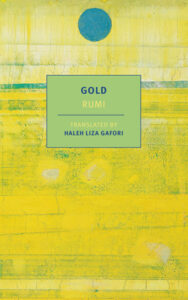


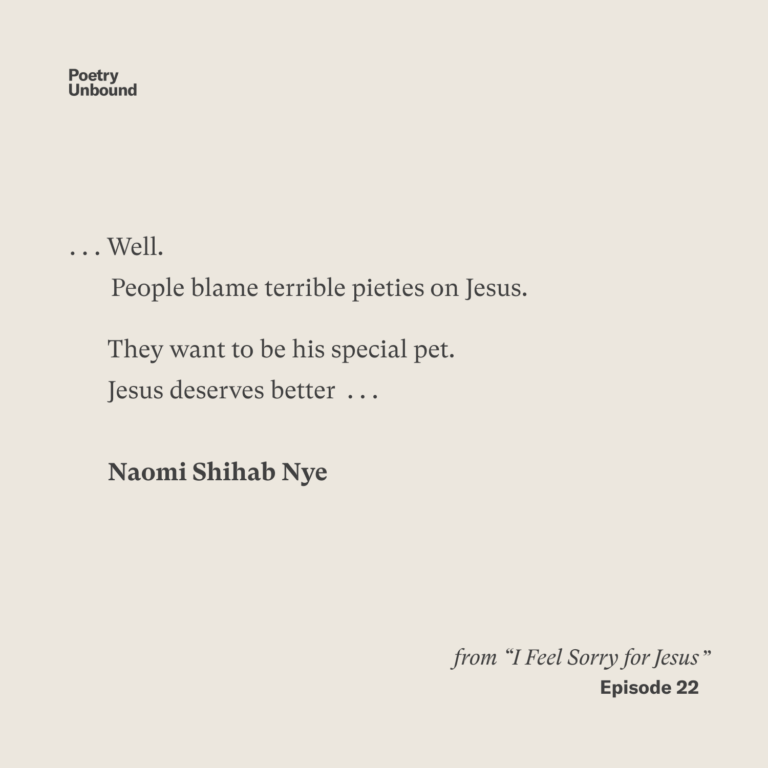
Reflections